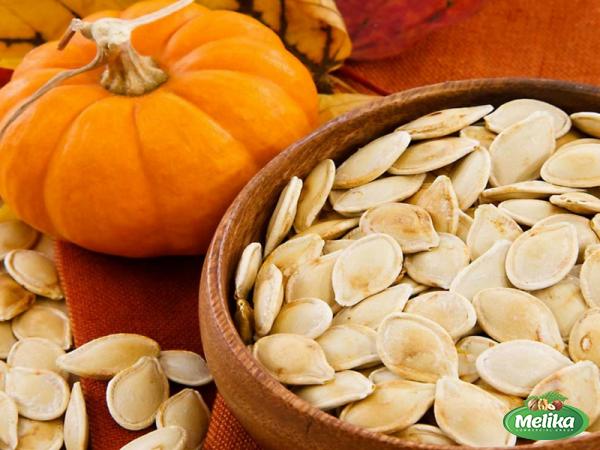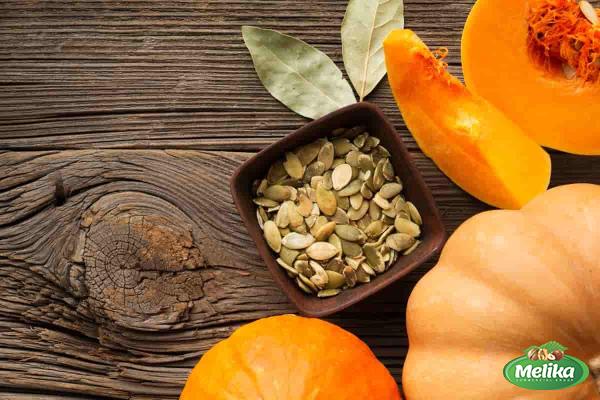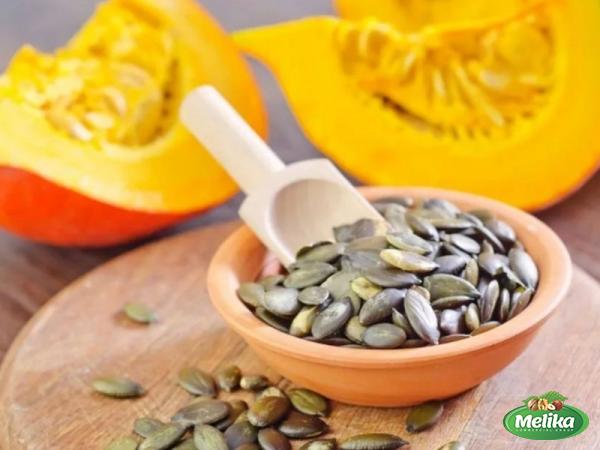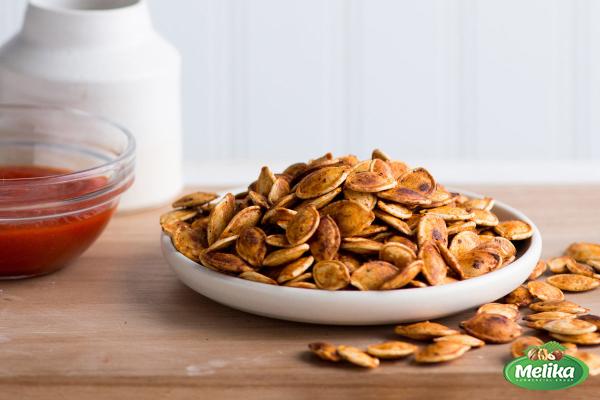Pumpkin seeds, also known as pepitas, are a highly popular and nutritious snack that can be enjoyed in a variety of ways. They are not only rich in essential nutrients but also offer several health benefits. This summary aims to provide an overview of the purchase and pricing aspects of different edible pumpkin seed types available in the market. 1. Types of Edible Pumpkin Seeds: There are primarily two types of edible pumpkin seeds: hulled and unhulled. a. Hulled Pumpkin Seeds: Hulled pumpkin seeds have had the outer shell or hull removed, leaving behind the green seed kernel. This type of pumpkin seed is commonly found in grocery stores and used for snacking or as an ingredient in various recipes. Hulled pumpkin seeds are typically roasted and salted, enhancing their flavor and texture. b. Unhulled Pumpkin Seeds: Unhulled pumpkin seeds retain their outer shell or hull. They are often larger in size and have a white or cream-colored appearance. These seeds are typically used in baking or for growing new pumpkin plants. Unhulled pumpkin seeds have a more earthy and robust flavor profile compared to hulled seeds. 2. Purchasing Considerations: When purchasing edible pumpkin seeds, several factors should be considered to ensure the best quality and value for money. a. Packaging and Brand: Opt for pumpkin seed brands that have a good reputation and reliable packaging to ensure freshness and product integrity. Look for packs that are airtight and properly sealed to protect the seeds from moisture, light, and oxygen. b. Organic vs. Conventional: Organic pumpkin seeds are grown without the use of synthetic pesticides, fertilizers, or genetic modifications. Choosing organic options can be beneficial for those seeking a more natural and environmentally friendly product. Conventional pumpkin seeds, on the other hand, are typically cheaper and more widely available. c. Roasted or Raw: Pumpkin seeds are often available in both roasted and raw forms.

nuts
 Roasted pumpkin seeds are commonly seasoned with salt or spices and provide a crunchy texture with enhanced flavor. Raw pumpkin seeds, on the other hand, have a softer texture and a more natural taste. Depending on personal preference and intended use, the choice between roasted or raw seeds should be considered. d. Bulk Purchases: For those who consume pumpkin seeds regularly, buying in bulk can be a cost-effective option. Bulk purchases allow you to save money, reduce packaging waste, and ensure a steady supply of pumpkin seeds over an extended period. Consider the shelf life of the seeds and storage options before purchasing in bulk. 3. Pricing Factors: The pricing of edible pumpkin seeds can vary based on several factors: a. Seed Type: Hulled pumpkin seeds tend to be slightly higher in price compared to unhulled pumpkin seeds. The additional processing involved in removing the outer hull contributes to the price difference. b. Quality and Grade: Pumpkin seeds are graded based on their size, appearance, and overall quality. The higher the grade, the higher the price. Smaller seeds and those with minor imperfections are typically cheaper than larger, more visually appealing seeds. c. Organic vs. Conventional: Organic pumpkin seeds are often priced higher than conventional seeds due to the additional costs involved in organic farming practices and certifications. d. Brand and Packaging: Established brands and premium packaging can also contribute to the price variation. More prominent and reputable brands may price their products higher compared to smaller or lesser-known brands. Packaging with added features like resealable bags or portion-controlled packs may also affect the price. 4. Availability: Edible pumpkin seeds are widely available in various retail outlets, including grocery stores, health food stores, and online platforms. Local farmers’ markets and specialty stores may offer a wider range of options, including heirloom pumpkin seed varieties. Check the availability of specific pumpkin seed types and brands in your region to make an informed purchase decision. Conclusion: When purchasing edible pumpkin seeds, understanding the different types available and considering factors such as packaging, organic versus conventional options, roasting preferences, and buying in bulk can help guide your decision-making process. Additionally, being aware of pricing factors like seed type, quality, brand, and packaging will allow you to make an informed choice and obtain the best value for your money. Enjoy the nutritious benefits and delightful flavors that edible pumpkin seeds have to offer!Title: Understanding the Purchase and Pricing of Edible Pumpkin Seed Types Introduction: Pumpkin seeds, also known as pepitas, are a highly popular and nutritious snack that can be enjoyed in a variety of ways. They are not only rich in essential nutrients but also offer several health benefits. In this article, we will delve deeper into the purchase and pricing aspects of different edible pumpkin seed types available in the market. Understanding these factors can help consumers make informed choices and get the best value for their money. 1. Hulled Pumpkin Seeds: Hulled pumpkin seeds have the outer shell or hull removed, resulting in a green seed kernel. This type of pumpkin seed is commonly found in grocery stores and is a popular choice for snacking or as an ingredient in various recipes. The process of hulling involves cleaning, drying, and mechanically removing the outer layer. Hulled pumpkin seeds are typically roasted and salted to enhance their flavor and texture. They offer a mild and nutty taste that is preferred by many consumers.
Roasted pumpkin seeds are commonly seasoned with salt or spices and provide a crunchy texture with enhanced flavor. Raw pumpkin seeds, on the other hand, have a softer texture and a more natural taste. Depending on personal preference and intended use, the choice between roasted or raw seeds should be considered. d. Bulk Purchases: For those who consume pumpkin seeds regularly, buying in bulk can be a cost-effective option. Bulk purchases allow you to save money, reduce packaging waste, and ensure a steady supply of pumpkin seeds over an extended period. Consider the shelf life of the seeds and storage options before purchasing in bulk. 3. Pricing Factors: The pricing of edible pumpkin seeds can vary based on several factors: a. Seed Type: Hulled pumpkin seeds tend to be slightly higher in price compared to unhulled pumpkin seeds. The additional processing involved in removing the outer hull contributes to the price difference. b. Quality and Grade: Pumpkin seeds are graded based on their size, appearance, and overall quality. The higher the grade, the higher the price. Smaller seeds and those with minor imperfections are typically cheaper than larger, more visually appealing seeds. c. Organic vs. Conventional: Organic pumpkin seeds are often priced higher than conventional seeds due to the additional costs involved in organic farming practices and certifications. d. Brand and Packaging: Established brands and premium packaging can also contribute to the price variation. More prominent and reputable brands may price their products higher compared to smaller or lesser-known brands. Packaging with added features like resealable bags or portion-controlled packs may also affect the price. 4. Availability: Edible pumpkin seeds are widely available in various retail outlets, including grocery stores, health food stores, and online platforms. Local farmers’ markets and specialty stores may offer a wider range of options, including heirloom pumpkin seed varieties. Check the availability of specific pumpkin seed types and brands in your region to make an informed purchase decision. Conclusion: When purchasing edible pumpkin seeds, understanding the different types available and considering factors such as packaging, organic versus conventional options, roasting preferences, and buying in bulk can help guide your decision-making process. Additionally, being aware of pricing factors like seed type, quality, brand, and packaging will allow you to make an informed choice and obtain the best value for your money. Enjoy the nutritious benefits and delightful flavors that edible pumpkin seeds have to offer!Title: Understanding the Purchase and Pricing of Edible Pumpkin Seed Types Introduction: Pumpkin seeds, also known as pepitas, are a highly popular and nutritious snack that can be enjoyed in a variety of ways. They are not only rich in essential nutrients but also offer several health benefits. In this article, we will delve deeper into the purchase and pricing aspects of different edible pumpkin seed types available in the market. Understanding these factors can help consumers make informed choices and get the best value for their money. 1. Hulled Pumpkin Seeds: Hulled pumpkin seeds have the outer shell or hull removed, resulting in a green seed kernel. This type of pumpkin seed is commonly found in grocery stores and is a popular choice for snacking or as an ingredient in various recipes. The process of hulling involves cleaning, drying, and mechanically removing the outer layer. Hulled pumpkin seeds are typically roasted and salted to enhance their flavor and texture. They offer a mild and nutty taste that is preferred by many consumers.
Specifications of nuts
 2. Unhulled Pumpkin Seeds: Unhulled pumpkin seeds retain their outer shell or hull, making them bigger and having a white or cream-colored appearance. These seeds are commonly used in baking or for growing new pumpkin plants. Unlike hulled pumpkin seeds, unhulled seeds have a slightly more earthy and robust flavor profile. They also offer a crunchier texture compared to their hulled counterparts. Unhulled pumpkin seeds are often preferred by those seeking a more natural and rustic taste. 3. Packaging and Brand: When purchasing edible pumpkin seeds, it is crucial to consider the packaging and brand. Opt for pumpkin seed brands that have a good reputation and reliable packaging to ensure freshness and product integrity. Look for packs that are airtight and properly sealed to protect the seeds from moisture, light, and oxygen. Quality packaging also helps maintain the crunchiness and flavor of the seeds. Established brands may offer a wider range of flavors and additional features, but smaller or lesser-known brands can also provide excellent options at a lower price point. 4. Organic vs. Conventional: Organic pumpkin seeds are grown without the use of synthetic pesticides, fertilizers, or genetic modifications. Choosing organic options can be beneficial for those seeking a more natural and environmentally friendly product. Organic farming practices promote biodiversity, soil health, and reduce chemical exposure. However, organic pumpkin seeds often come at a higher price compared to conventional seeds due to the additional costs involved in organic farming practices and certifications. Conventional pumpkin seeds, on the other hand, are typically cheaper and more widely available. 5. Roasted or Raw: Pumpkin seeds are available in both roasted and raw forms. Roasted pumpkin seeds are commonly seasoned with salt or spices, providing a crunchy texture and enhanced flavor. The roasting process also helps remove any residual moisture, extending the shelf life of the seeds. Roasted pumpkin seeds are conveniently ready to eat and are ideal for snacking. On the other hand, raw pumpkin seeds have a softer texture and a more natural taste. They are often used in a variety of recipes like salads, granolas, or pestos. The choice between roasted or raw seeds depends on personal preference and intended use. 6. Bulk Purchases: For those who consume pumpkin seeds regularly or in larger quantities, buying in bulk can be a cost-effective option. Bulk purchases allow you to save money, reduce packaging waste, and ensure a steady supply of pumpkin seeds over an extended period. However, it is essential to consider the shelf life of the seeds and storage options before purchasing in bulk. Proper storage, such as keeping them in a cool, dry place, can help maintain their freshness and quality. 7. Pricing Factors: The pricing of edible pumpkin seeds can vary based on several factors.
2. Unhulled Pumpkin Seeds: Unhulled pumpkin seeds retain their outer shell or hull, making them bigger and having a white or cream-colored appearance. These seeds are commonly used in baking or for growing new pumpkin plants. Unlike hulled pumpkin seeds, unhulled seeds have a slightly more earthy and robust flavor profile. They also offer a crunchier texture compared to their hulled counterparts. Unhulled pumpkin seeds are often preferred by those seeking a more natural and rustic taste. 3. Packaging and Brand: When purchasing edible pumpkin seeds, it is crucial to consider the packaging and brand. Opt for pumpkin seed brands that have a good reputation and reliable packaging to ensure freshness and product integrity. Look for packs that are airtight and properly sealed to protect the seeds from moisture, light, and oxygen. Quality packaging also helps maintain the crunchiness and flavor of the seeds. Established brands may offer a wider range of flavors and additional features, but smaller or lesser-known brands can also provide excellent options at a lower price point. 4. Organic vs. Conventional: Organic pumpkin seeds are grown without the use of synthetic pesticides, fertilizers, or genetic modifications. Choosing organic options can be beneficial for those seeking a more natural and environmentally friendly product. Organic farming practices promote biodiversity, soil health, and reduce chemical exposure. However, organic pumpkin seeds often come at a higher price compared to conventional seeds due to the additional costs involved in organic farming practices and certifications. Conventional pumpkin seeds, on the other hand, are typically cheaper and more widely available. 5. Roasted or Raw: Pumpkin seeds are available in both roasted and raw forms. Roasted pumpkin seeds are commonly seasoned with salt or spices, providing a crunchy texture and enhanced flavor. The roasting process also helps remove any residual moisture, extending the shelf life of the seeds. Roasted pumpkin seeds are conveniently ready to eat and are ideal for snacking. On the other hand, raw pumpkin seeds have a softer texture and a more natural taste. They are often used in a variety of recipes like salads, granolas, or pestos. The choice between roasted or raw seeds depends on personal preference and intended use. 6. Bulk Purchases: For those who consume pumpkin seeds regularly or in larger quantities, buying in bulk can be a cost-effective option. Bulk purchases allow you to save money, reduce packaging waste, and ensure a steady supply of pumpkin seeds over an extended period. However, it is essential to consider the shelf life of the seeds and storage options before purchasing in bulk. Proper storage, such as keeping them in a cool, dry place, can help maintain their freshness and quality. 7. Pricing Factors: The pricing of edible pumpkin seeds can vary based on several factors.
buy nuts
 Seed Type: Hulled pumpkin seeds tend to be slightly higher in price compared to unhulled pumpkin seeds. The additional processing involved in removing the outer hull contributes to the price difference. However, the price variation may also depend on the brand and specific quality of the seeds. Quality and Grade: Pumpkin seeds undergo grading based on their size, appearance, and overall quality. Higher-grade seeds that are larger, more visually appealing, and have fewer imperfections generally demand a higher price. Smaller seeds or ones with minor imperfections are typically cheaper but still offer excellent nutritional value. Organic vs. Conventional: As mentioned earlier, organic pumpkin seeds are often priced higher due to the additional costs associated with organic farming practices and certifications. The decision to choose organic or conventional pumpkin seeds depends on personal preferences and priorities, such as health-consciousness or environmental concerns. Brand and Packaging: Established brands and premium packaging can also contribute to the price variation. More prominent and reputable brands may price their products higher compared to smaller or lesser-known brands. Packaging with added features like resealable bags or portion-controlled packs may also affect the price. 8. Availability: Edible pumpkin seeds are widely available in various retail outlets, including grocery stores, health food stores, and online platforms. Local farmers’ markets and specialty stores may offer a wider range of options, including heirloom pumpkin seed varieties. Check the availability of specific pumpkin seed types and brands in your region to make an informed purchase decision. Online platforms offer the convenience of shopping from home and provide access to a broader range of both local and internationally sourced pumpkin seeds. Conclusion: Understanding the different types of edible pumpkin seeds, considering factors such as packaging, organic versus conventional options, roasted versus raw seeds, bulk purchases, and pricing factors can help consumers make informed choices when purchasing. By paying attention to quality, brand reputation, and personal preferences, consumers can ensure they get the best value for their money. Enjoy the nutritious benefits and delightful flavors that edible pumpkin seeds have to offer!
Seed Type: Hulled pumpkin seeds tend to be slightly higher in price compared to unhulled pumpkin seeds. The additional processing involved in removing the outer hull contributes to the price difference. However, the price variation may also depend on the brand and specific quality of the seeds. Quality and Grade: Pumpkin seeds undergo grading based on their size, appearance, and overall quality. Higher-grade seeds that are larger, more visually appealing, and have fewer imperfections generally demand a higher price. Smaller seeds or ones with minor imperfections are typically cheaper but still offer excellent nutritional value. Organic vs. Conventional: As mentioned earlier, organic pumpkin seeds are often priced higher due to the additional costs associated with organic farming practices and certifications. The decision to choose organic or conventional pumpkin seeds depends on personal preferences and priorities, such as health-consciousness or environmental concerns. Brand and Packaging: Established brands and premium packaging can also contribute to the price variation. More prominent and reputable brands may price their products higher compared to smaller or lesser-known brands. Packaging with added features like resealable bags or portion-controlled packs may also affect the price. 8. Availability: Edible pumpkin seeds are widely available in various retail outlets, including grocery stores, health food stores, and online platforms. Local farmers’ markets and specialty stores may offer a wider range of options, including heirloom pumpkin seed varieties. Check the availability of specific pumpkin seed types and brands in your region to make an informed purchase decision. Online platforms offer the convenience of shopping from home and provide access to a broader range of both local and internationally sourced pumpkin seeds. Conclusion: Understanding the different types of edible pumpkin seeds, considering factors such as packaging, organic versus conventional options, roasted versus raw seeds, bulk purchases, and pricing factors can help consumers make informed choices when purchasing. By paying attention to quality, brand reputation, and personal preferences, consumers can ensure they get the best value for their money. Enjoy the nutritious benefits and delightful flavors that edible pumpkin seeds have to offer!











Your comment submitted.